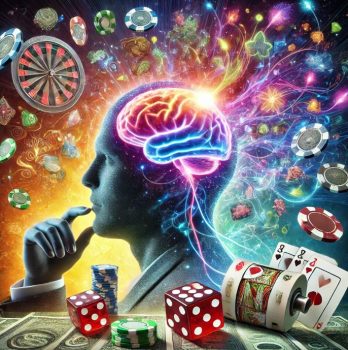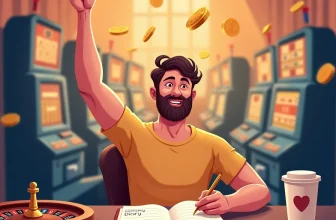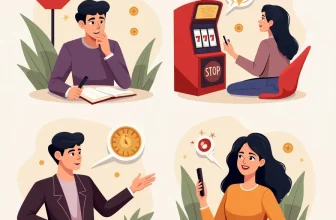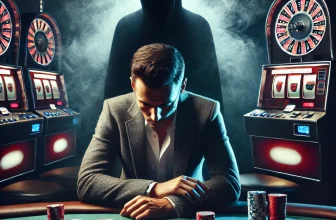"Well, now I'm definitely going to hit the jackpot! Just one spin and I'll be swimming in money..."
Sound familiar? If you've ever played slot machines, made sports betting or even bought lottery tickets, you probably felt this special surge of energy. As if something inside you was telling you: “Just a little more and you’ll definitely get lucky!” But why do we think that way? Where does the euphoria of winning come from? And most importantly, why do we feel the urge to win back when we lose? Let’s figure out together, what happens in our brain, when we dive into the world of excitement.
Today I want to share my knowledge and experience by telling in simple human language about how our brain reacts to excitement and why we sometimes can't stop. I promise: there will be creativity, a little humor, and, of course, serious information backed by scientific data.
The article turned out to be quite voluminous, but it is easy to read. Sit back, we are starting!
Content
- Brain and passion: why are we so drawn to the game?
- The Psychology of Gambling: How Emotions Capture Us
- The Neurobiology of Winning: Why Do We Feel Euphoria?
- Why does losing make you want to win it back?
- Cognitive Biases: How the Brain Deceives Us
- Excitement in 2025: The Digital Age and New Challenges
- How to maintain control and avoid getting trapped?
- "To play or not to play?" is the main question
- Summary: What happens in our heads when we play?
- Useful tips from a psychologist
- Why is our article unique for 2025?
- Final Thoughts: Keep Your Gambling in Check
Brain and passion: why are we so drawn to the game?
The Power of Dopamine: The Master 'Conductor' of Pleasure
If we talk about the psychology of gambling, we can't ignore neurobiology. There are reward system, and one of the key neurotransmitters in it is dopamineWhen we place a bet or press a button on a slot machine, we expect a possible win. And this expectation itself causes a release of dopamine, a substance that is responsible for the feeling of anticipation, joy and motivation.
-
Why do we feel euphoria from winning?
When we're lucky, dopamine literally "floods" the brain. We experience a surge of happiness, similar to what people get when they do extreme sports or taste something delicious. The brain says, "Wow, that's cool! Let's do it again!" And we go play again. -
How does dopamine keep us coming back?
The most interesting thing is that dopamine starts working even before the win itself. We feel anticipation, hope, excitement. This feeling gets us hooked on the game, because the brain gets used to the thought: “Luck is about to happen!” This explains why we continue to bet even after several losses.
The Almost-Win Mechanism: Why We Can't Stop
There is a phenomenon that is particularly noticeable in slot machines: "almost victory". You spin the reels, and three identical symbols are about to appear, but at the last moment the symbol turns out to be slightly different. The brain reacts to this almost the same way as to a real win: we feel that we were “very close”, and we are drawn to try again.
- Why does losing make you want to win it back?
In such situations, dopamine also plays a role. It is released not only when you win, but also when you feel that “luck was near.” The brain interprets this as a signal: “Just a little more, and you will win! Don’t stop!” This is why people can get stuck on machines, investing more and more money.
The illusion of control and the "player effect"
It is often found in gambling illusion of control: we think that we can somehow influence the outcome. Players throw the dice in a certain way, perform “lucky” rituals, enter “their” numbers in the roulette. In fact, this is a trick of the brain. But the feeling of control increases involvement and gives false confidence: “I do everything myself, so I can win!”
In addition, there is "player effect" (or "gambler's fallacy"): after a few losses, it seems that now is the time to get lucky. But the reality is that each spin of a slot machine or a spin of a roulette wheel is an independent event. Past results do not affect future ones, but the brain likes to look for patterns where there are none.
The Psychology of Gambling: How Emotions Capture Us
Emotional swings: from euphoria to despair
Gambling isn't just about dopamine. It's also about a powerful emotional "catalyst", capable of quickly changing a person's mood. You can rejoice big win, and a minute later - already grieving because you lost everything. Such emotional swings can be very dangerous if you do not know how to control yourself.
- The euphoria of winning: the brain rewards us, we feel like winners, our self-esteem grows, and it seems like the whole world is at our feet.
- Feeling guilty and ashamed after losing: if a person has lost a large sum, he may feel like a “loser”, begin to blame himself or look for excuses.
- The desire to get even: the brain tries to restore "balance" and demands to repeat the "successful" experience. As a result, the player drives himself into a trap.
The role of stress and "adrenaline"
For many, gambling is not only a way to win money, but also way to get a dose of adrenaline. Sitting on the couch and calmly watching a TV series is one thing. But betting a large sum on your favorite team to win is something else entirely. Your heart is pounding, your palms are sweating, your thoughts are racing: "What if I get lucky?!"
- Adrenaline stimulates our body, preparing it for action ("fight or flight"). But in the context of betting and casinos, it can become a "doping" that forces us to make rash moves.
- Cortisol (stress hormone) can also increase. If the bet doesn't win, the stress level increases and we want to immediately compensate for the losses.
All this creates a vicious circle: the more you play, the more emotions, the stronger the attachment.
The Neurobiology of Winning: Why Do We Feel Euphoria?
Dopamine 'explosion' when you win
We've already talked about dopamine, but let's go deeper. When we win, our brain literally explodes with dopamine, which acts on dopamine receptors in areas such as nucleus accumbens и prefrontal cortex. This gives us a feeling of a sharp rise in mood.
- Euphoria: the feeling that “I am the king of the world!”
- A surge of energy: I want to scream, laugh, hug friends.
- Increased self-esteem: we begin to think that we have a special “gift” or “flair” for winning.
"The Reward Hormone" and the Dangers of Addiction
The problem is that dopamine is also responsible for formation of dependencies. The body gets used to high doses of this hormone, and in order to feel the same euphoria, we need more and more "stimuli". In the case of gambling, this means increasingly larger bets, riskier decisions, and more frequent gambling.
If a person is not aware of this biochemical trap, he can become seriously addicted, with his whole life revolving around attempts to get another “dose” of dopamine through the game.
Why does losing make you want to win it back?
The "almost won" effect
Many machines and lotteries are specially set up to occasionally give out "almost a win" — when one symbol or number is missing. The brain perceives this as a signal: “That’s it, just a little bit more — and I would have won!” This creates the illusion that next time will be successful. In reality, the odds do not change, but we feel that we are “close to success”.
The need to restore justice
When we lose, our brain starts looking for someone to blame: “It’s not fair! I should have been lucky!” We want "to restore justice" and return the money that we feel was "unjustly" taken away. This psychological phenomenon is intensified if the loss was "stupid" or "over a trifle."
- The phenomenon of "locked costs": if you have already spent a lot of money, it is a pity to stop. You want to "return" at least part of it, and we continue to bet.
Cognitive Biases: How the Brain Deceives Us
The illusion of control
We often overestimate our ability to influence the outcome. A classic example is throwing dice: if we want to roll a high number, we throw the dice harder; if we want to roll a low number, we throw the dice weaker. In reality, this does not affect the outcome, but the brain convinces us that we are “controlling” the process.
"Gambler's effect" (Gambler's fallacy)
After a series of failures, we think that now we "must get lucky", because "how long can you lose in a row?" But the probability of each new event does not depend on the previous ones. This misconception makes us bet again and again.
"Confirmation effect"
We only remember the times we got it right and forget the many times we lost. This distorts our perception and we think we "win often."
Excitement in 2025: The Digital Age and New Challenges
We live in a world where gambling has become even more accessible. Online casinos, mobile apps, instant lotteries - all this is at your fingertips. This means that risks of addiction have grown, because a person does not need to go to a real casino to try his luck. A smartphone is enough.
- Social networks and advertising: Algorithms may show us more gambling ads if we have already shown interest in them.
- Gambling: Many mobile games implement random reward mechanics, evoking the same emotional reactions in us as in a casino.
- Quick bets: the ability to place a bet in a couple of clicks without thinking through the decision increases the danger of impulsive actions.
How to maintain control and avoid getting trapped?
A conscious approach to the game
If you are playing for fun, it is important to be clear about your goals and set limits:
- Financial limit: decide in advance the amount you are willing to lose. If you lose, do not try to win it back.
- Time limit: Do not spend more than a certain amount of time per day or week playing the game.
- Emotional limit: If you feel like you're starting to get angry, panicky, or overly happy, take a break.
Training and information
The more you know about statistics, odds, and psychological traps, the harder it is for your brain to fool you. Read articles, watch videos from experts, and talk to other players. Understanding the mechanics of the game reduces the risk of impulsive betting.
Support from relatives and specialists
If you feel that your gambling has become uncontrollable, do not hesitate to seek help. Psychologists, specialized centers, support groups - all this works and helps to return life to normal.
"To play or not to play?" is the main question
In fact, gambling not evil by themselves. This is just one of the ways to have fun and get vivid emotions. But, like any “strong stimulus”, they can become a cause of addiction if a person does not know how to control himself.
-
It's worth playing if:
- Do you have clear budget and you don't go beyond it.
- You understand that the game is entertainment, not a way to get rich.
- You save emotional stability and don't panic or get euphoric from one bet.
-
Don't play if:
- Do you have financial difficulties and you try to solve them with the help of a casino.
- Do you feel that can't stop even after losing.
- The game makes you feel excessive stress or negatively affects work, study, family.
Summary: What happens in our heads when we play?
- Dopamine — the key pleasure hormone that makes us crave winning and anticipate success.
- The euphoria of winning occurs due to the release of dopamine and the feeling of “I’m a winner!”
- Losing makes you want to win back because of the illusion of “almost winning”, the effect of “locked costs” and the need to “get your own back”.
- Cognitive distortions (illusion of control, gambler's fallacy, confirmation effect) prevent us from adequately assessing the odds.
- Modern Technology makes it easier to access games, increasing the risks of addiction.
- Control is possible if you adhere to financial, time and emotional limits, and also understand the biochemistry of excitement.
Useful tips from a psychologist
- Record the results: keep a betting diary or play casino. This way you will see the real picture - how much you won and lost.
- Set a safe word: when emotions overwhelm you, agree with yourself (or with loved ones) that when you reach a certain level of loss/win, you will stop.
- Develop other sources of pleasure: hobbies, sports, creativity. If the only "driver" of joy is a game, this is an alarming signal.
- Don't be afraid to ask for help: If you feel like gambling has started to ruin your life, there are psychologists who specialize in gambling addiction.
Why is our article unique for 2025?
We live in an era where gambling is not standing still. Online platforms are growing, mobile applications are becoming more convenient, and gamification mechanics are penetrating even unrelated areas. Therefore, understanding neurobiological and psychological aspects of gambling becomes critically important.
- In 2025 technology allows players to place bets from anywhere in the world, at any time of the day.
- Additional realities: virtual reality (VR casinos), cryptocurrencies (crypto casinos) and new formats (case openings, NFT lotteries).
- Risks: the more opportunities, the greater the risk of becoming “hooked” on the game, without noticing how it affects your wallet and psyche.
Our article takes all these aspects into account and explains, what's going on in your head a person when faced with gambling. Understanding these mechanisms, you can avoid the pitfalls and enjoy the game without harming yourself.
Final Thoughts: Keep Your Gambling in Check
Bottom line. Gambling is normal. It’s part of human nature to seek risk and new experiences. But like any strong emotion, it can become destructive if we let it control us.
- The euphoria of winning — is a cool thing, but it shouldn’t become an end in itself.
- Dopamine - our helper, but also our enemy, if we forget about logic.
- The desire to get even — a natural reaction, but often leading to even greater losses.
- Illusions of Control and cognitive biases - traps that the brain sets for us.
- В 2025 gambling even more accessible, so you need to be doubly careful.
I hope this article will help you look at gambling from a different perspective and maintain control over the situation. Remember: gambling should be fun, not the meaning of life. If you feel that the situation is getting out of control, it is better to stop or contact a specialist.
I wish you strong nerves, a clear mind and the ability to enjoy the game without harming yourself and your loved ones!





